Inflation jumps 9.2% in October
Increase led by double-digit rise in prices of non-perishable food items

The inflation rate jumped to 9.2% in October 2021 - the highest in four months - due to government-induced policies that led to a double-digit increase in prices of non-perishable food items, electricity and transport groups.
The Consumer Price Index (CPI) swelled 9.2% in October over the same month of last year, the Pakistan Bureau of Statistics (PBS) reported on Monday.
It was for the first time in the past five months that the inflation rate jumped above 9%, beating expectations of the Ministry of Finance.
Alarmingly, the Wholesale Price Index (WPI) inflation skyrocketed 21.2%, indicating that prices would remain high in the coming months. The WPI rose mainly because of a massive increase in prices of textile and apparels, metal products, other transport goods, food, beverages and leather products.
Last Thursday, the Ministry of Finance predicted a “downward resumption” of inflation from October and beyond, and stated that the inflation rate was “expected to settle below the level observed in September”.
The deviation in the inflation path suggests that prices have gone out of the control of the government, which has not yet fulfilled its promise to reduce prices of ghee by Rs45 to Rs290 per kg by slashing duties and taxes.
Finance Adviser Shaukat Tarin and Planning Minister Asad Umar had announced that taxes and duties would be reduced to cut the boiling cooking oil and ghee prices in the country.
Prices of the commodities, which have a direct bearing on the daily lives of people, increased further. However, the government continued to defend itself by quoting prices of goods in other countries by comparing with Pakistani currency, which is the worst performing currency in the region. The CPI-based inflation accelerated to 9.6% in urban areas but marginally came down to 8.7% in villages and towns, according to the PBS.
It was mainly because of increase in prices of non-food items owing to the government’s decision to increase administrative prices of electricity and petroleum products. The non-food inflation surged 9.7% in urban areas and 10% in rural areas last month, according to the national data collecting agency.
The pace of food inflation slowed down to 9.4% in cities from 10.8% and in villages and towns to 7.9% from the previous level of 9.1% due to decrease in prices of perishable goods. However, the prices of non-perishable goods jumped significantly as people still waited for the government’s decision to reduce prices of cooking oil, sugar and wheat flour.
The surge in prices came amid a sharp fall in the value of the rupee in past three months to Rs170.3 to a dollar on Monday. On May 3, the rupee had traded at Rs153.36 to a dollar, which lost Rs17.2, or 11% of its value, in just five months.
The reduction in the rupee value is pushing up the cost of every imported commodity including wheat, sugar, cooking oil, crude oil and raw material for industries.
Core inflation - calculated by excluding food and energy items - further inched up to 6.7% in urban and rural areas last month, reported the national data collecting agency.
The food group saw 8.3% increase in prices in October compared to the same month a year ago despite 10.8% reduction in prices of perishable goods. The non-perishable food items prices soared 12.3% last month.
The PBS stated that vegetable ghee prices increased over 43%, mustard oil 42%, cooking oil 40%, chicken 34.7%, pulse masoor 17.6%, meat over 17%, fruits 15.8%, wheat flour 13%. Tarin had promised to bring down the prices of both cooking oil and wheat flour.
The PBS reported that the milk rates also jumped to 9.5%.
However, tomatoes prices reduced nearly half followed by 29% reduction in prices of pulse moong onions and Potatoes down by 19%.
Inflation rate for the housing, water, electricity, gas and fuel group - having one-fourth weight in the basket - increased to 12% last month -a double digit increase due to the government’s decision to increase prices of electricity by 32%.
Published in The Express Tribune, November 2nd, 2021.
Like Business on Facebook, follow @TribuneBiz on Twitter to stay informed and join in the conversation.


















COMMENTS
Comments are moderated and generally will be posted if they are on-topic and not abusive.
For more information, please see our Comments FAQ